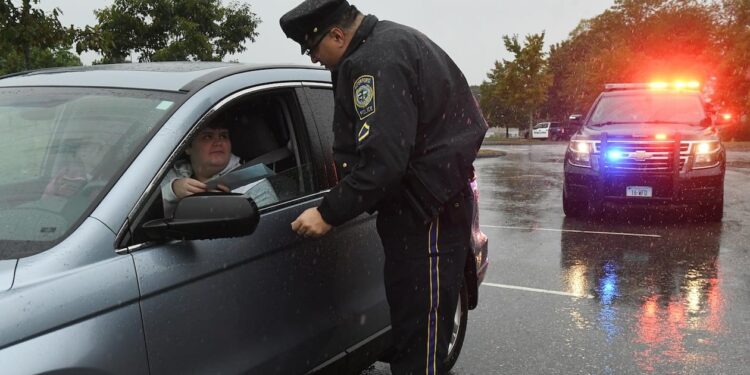Imagine you’re cruising down I-70 between St. Louis and Kansas City. The sun is shining, the music is playing, and it’s a perfect day for a road trip. Suddenly, you see those flashing red and blue lights in your rearview mirror. You pull over, heart sinking a little, and prepare to interact with a Missouri state trooper.
The stop goes smoothly; you have your license, registration, and proof of insurance in order. But then, the officer asks a question that throws you for a loop: “Can I see your phone?”
This can be a nerve-wracking situation. Our phones are personal devices that hold a vast amount of private information, photos, messages, and even browsing history. The thought of a police officer sifting through all that data can be unsettling.
So, the question remains: can Missouri police search your phone during a traffic stop? The answer, like many things in law, is not a simple yes or no. It depends on the circumstances. This blog dives deep into Missouri’s laws regarding phone searches during traffic stops, explores your rights as a citizen, and offers guidance on how to navigate this situation.
Understanding Your Rights: The Fourth Amendment
The foundation for understanding police interaction with your phone lies in the Fourth Amendment to the U.S. Constitution. It safeguards against “unreasonable searches and seizures,” which applies to both your person and your belongings. This essentially means that law enforcement cannot search you or your property without justification.
The key concept here is probable cause. In simpler terms, the police need a valid reason to believe you’ve committed a crime or that your phone contains evidence of a crime. A hunch or a suspicion is not enough. Probable cause for a phone search typically arises during a DUI arrest or if the officer observes illegal activity on the phone itself while the stop is happening (e.g., sending a drug deal text message).
The Riley v. California Decision
A landmark Supreme Court case in 2014, Riley v. California, significantly impacted cell phone searches during traffic stops. The court ruled that due to the vast amount and sensitive nature of data stored on smartphones, they are considered a different category than traditional belongings like wallets or purses. This decision established that a warrant is generally required to search the contents of a cellphone, even if the phone itself is seized during an arrest.
Exceptions to the Warrant Requirement
There are some exceptions to the warrant requirement for phone searches during traffic stops. Here’s a breakdown of the most common ones:
- Consent: If you freely give your permission for the officer to search your phone, they can do so legally. It’s important to remember that consent can be withdrawn at any time. Be cautious about consenting to a search, especially if you’re unsure of your rights.
- Plain View: If the officer sees evidence of a crime in plain view on your phone screen while it’s unlocked, they can seize the phone and likely get a warrant to examine the contents further. This could be something like an open text message containing a drug deal or an incriminating social media post.
- Exigent Circumstances: In rare situations where there’s an emergency and a threat to public safety, the officer might search your phone without a warrant. This could involve situations like preventing a bomb detonation or locating a missing child.
Important Tips for Missouri Drivers
Here are some crucial tips to remember if you’re ever pulled over by a police officer in Missouri and they ask to see your phone:
- Be polite but firm. You have the right to refuse a search of your phone. If the officer asks to see it, politely but firmly state, “I do not consent to a search of my phone.”
- Know when to remain silent. You have the right to remain silent during a traffic stop. This applies to answering questions about your phone as well.
- Don’t volunteer information. Don’t mention anything that might give the officer probable cause to search your phone.
- If you’re arrested, don’t enter your passcode. If you’re arrested, the police cannot force you to enter your passcode or fingerprint to unlock your phone.
- Seek legal counsel. If the police seize your phone or you’re unsure of your rights, contact an attorney specializing in criminal defense. They can advise you on the best course of action.
Conclusion
Remember, you have the right to refuse a search and to remain silent. By politely but firmly asserting these rights, you can protect your privacy.
However, it’s important to be aware that refusing a search could raise suspicion with the officer, especially if they already have a hunch about illegal activity. If you’re unsure of the situation, it’s best to err on the side of caution and politely ask if you are free to leave.










